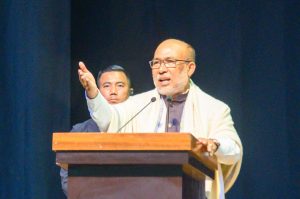President’s rule has been imposed on the Indian border state of Manipur, four days after its controversial chief minister, N. Biren Singh, resigned from his post.
On the evening of February 13, the Union Home Ministry said that President Droupadi Murmu is of the opinion that the government in Manipur cannot be carried on in “accordance with the provisions of the Constitution.”
Consequently, President’s rule, as federal rule is known in India, had been imposed on the state.
“I hereby proclaim that I – assume to myself as President of India all functions of the Government of the State of Manipur and all powers vested in or exercisable by the Governor of that State,” the President’s Office said in a statement.
The state assembly has also been put under suspended animation.
India’s ruling Bharatiya Janata Party (BJP), which also headed the Manipur government, had tried to select a successor to Singh following his resignation. But the efforts ran into a dead end as there was no consensus among BJP legislators despite several meetings convened by the party’s northeast coordinator Sambit Patra.
BJP’s failure to find a successor to Singh is not surprising given the circumstances in which he was compelled to resign. Over 250 people were killed and thousands displaced from their homes in the 21 months of violent clashes between Manipur’s Meitei majority and Kuki-Zo communities. The security situation in the border state has remained tense with clashes being reported intermittently.
Singh submitted his resignation to Manipur Governor Ajay Kumar Bhalla in the state capital Imphal on February 9, a day before the state assembly was scheduled to convene for the budget session. The development also came a day after he met Union Home Minister Amit Shah and BJP national President J. P. Nadda in New Delhi, where the matter about his resignation and its implications are believed to have been discussed. Singh ran the BJP-led government with support from the Naga People’s Front (NPP).
Kuki-Zo groups and 10 legislators from the community, including seven from the BJP, held Singh responsible for the ethnic conflict in the state, which began on May 3, 2023.
However, the immediate trigger for his resignation appears to be the threat of a no-confidence motion in the assembly by the opposition Congress. The BJP leadership was likely unsure if Singh would survive the vote, as opposition to his leadership has been mounting within the party. The Indian Express quoted a few unnamed BJP dissident legislators as saying they are preparing for a “big and unprecedented” move in the forthcoming assembly session.
A Sharda Devi, president of the BJP’s Manipur unit, clarified that Singh’s resignation was to restore peace in the state and there was no conflict within the party.
The resignation came about a week after the Supreme Court asked for a report from a central forensics lab on leaked audio tapes that established Singh’s role in fueling the ethnic conflict in the state, as alleged by a Kuki organization.
Singh’s position in the party began to weaken in the latter part of last year with several BJP legislators from the state’s Imphal Valley meeting the party’s central leadership in New Delhi, repeatedly seeking his replacement as the chief minister. Assembly speaker Thokchom Satyabrata had also briefed Shah about the continuing crisis in the state and the chief minister’s inability to restore normalcy. However, the party leadership was reluctant to accept their demand.
That trouble was brewing for Singh was amply indicated in a series of developments last year when several allies decided to sever their ties with the coalition government. The Kuki People’s Alliance, formed a few months before the state assembly election in 2022, withdrew its support for the government in August of last year. Three months later, seven legislators of the NPP followed suit, citing the failure of the government machinery to resolve the crisis. Again, last month, the Janata Dal (United) also withdrew support, although the party sacked its Manipur state president and reiterated its support for the BJP-led government.
Within hours of Singh’s resignation, Governor Bhalla decided to revoke the assembly session scheduled to commence on February 10.
The resignation and the governor’s decision to revoke the assembly have drawn sharp reactions from the Congress party. A. Bimol Akoijam, a Congress parliamentarian from Manipur, has expressed concerns over the political situation in the state following Singh’s resignation. Leader of the Opposition in the lower house of parliament Rahul Gandhi repeated his demand that Prime Minister Narendra Modi must visit Manipur and explain his plan to restore normalcy.
The Indigenous Tribal Leaders Forum, an umbrella Kuku group that has been demanding Singh’s resignation since the ethnic strife began, said their agitation would not be called off till the demand for a separate administration is accepted.
As per India’s constitution, President’s rule can be imposed in any state of the country for a maximum period of three years with Parliament’s approval every six months.
A middle-rung BJP functionary in Manipur explained that there was a better possibility of a consensus being forged among the legislators with President’s rule in the state. He said that the party leadership will continue to hold meetings in the state till the crisis is resolved.

































